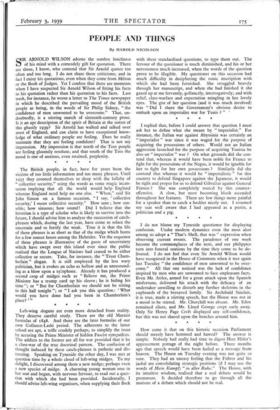The British people, in fact, have for years been the
victims of too little information and too many phrases. Until 1935 they crooned themselves to sleep with the lullaby of " collective security," using the words as some magic incan- tation implying that all the world would help England whereas England need help no one else. " When," said Sir John Simon on a famous occasion, " I say, ' collective security,' I mean collective security." How sane ; how sen- sible; how sinuous; how sound! Did I believe that the historian is a type of scholar who is likely to survive into the future, I should advise him to analyse the succession of catch- phrases which, during the last year, have come to solace the uncertain and to fortify the weak. True it is that the life of these phrases is as short as that of the midge which hums for a few sunset hours among the Hebrides. Yet the sequence of these phrases is illustrative of the gusts of uncertainty which have swept over this island ever since the public realised that the League of Nations had ceased to be either collective or secure. Take, for instance, the " Trust Cham- berlain " slogan. It is still employed by the less wary politician, but it evokes an echo as hollow and as unresound- ing as a blow upon a xy:ophone. Already it has produced a second crop of midges such as " Believe me, the Prime Minister has a trump card up his sleeve; he is biding his time "; or " But for Chamberlain we should not be sitting in this hall tonight "; or " I ask you this question: ' What would you have done had you been in Chamberlain's place? ' "










































 Previous page
Previous page